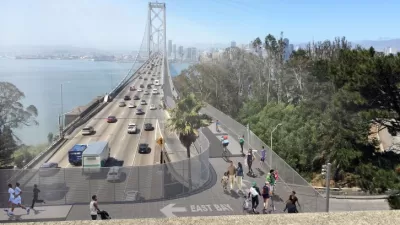The existing bike path on the eastern span of the Bay Bridge meets an abrupt dead end, though it will be extended to Yerba Buena Island next summer. Plans are underway to extend the path to San Francisco, but it won't be cheap.
"Bay Bridge officials are looking for a cheaper way to build a two-mile trail along the western span after a study estimated the project would cost a whopping $400 million to $500 million," writes Dennis Cuff of the Contra Costa Times. Arup North America, Ltd won the $10 million contract for the engineering study to develop a less costly design for the bicycle-pedestrian path.
Up to four alternatives will be examined in detail for a 12-foot-wide steel deck path separated from auto traffic lanes along the 2-mile-long west span between San Francisco and Yerba Buena Island.
Two days earlier, Cuff wrote that the "Bay Area Toll Authority, the regional agency that collects toll money to operate the Bay Bridge and six other state-owned spans," indicated that the current estimate was "too much."
"It's just not fundable within our current constraints," said John Goodwin, a spokesman for the toll authority. "The plan is to look at alternatives to shrink that estimate and come up with something that is buildable and fundable.
The new $6.4 billion eastern span, from Oakland to Yerba Buena Island, opened in September, 2013. The bike path could not extend fully to Yerba Buena Island "until workers demolish a portion of the old bridge," wrote Justin Berton of the San Francisco Chronicle shortly before the new span opened.
"Renee Rivera, executive director of Bike East Bay [formerly the East Bay Bicycle Coalition], said the study was 'a crucial next step to get to a fundable plan for a west span path' and was confident the price can be pared down," writes Michael Cabanatuan of the San Francisco Chronicle.
[Hat tip to MTC-ABAG Library's News Headlines]
FULL STORY: Bay Bridge officials approve $10 million study on adding path to west span

Alabama: Trump Terminates Settlements for Black Communities Harmed By Raw Sewage
Trump deemed the landmark civil rights agreement “illegal DEI and environmental justice policy.”

Study: Maui’s Plan to Convert Vacation Rentals to Long-Term Housing Could Cause Nearly $1 Billion Economic Loss
The plan would reduce visitor accommodation by 25% resulting in 1,900 jobs lost.

Planetizen Federal Action Tracker
A weekly monitor of how Trump’s orders and actions are impacting planners and planning in America.

Wind Energy on the Rise Despite Federal Policy Reversal
The Trump administration is revoking federal support for renewable energy, but demand for new projects continues unabated.

Passengers Flock to Caltrain After Electrification
The new electric trains are running faster and more reliably, leading to strong ridership growth on the Bay Area rail system.

Texas Churches Rally Behind ‘Yes in God’s Back Yard’ Legislation
Religious leaders want the state to reduce zoning regulations to streamline leasing church-owned land to housing developers.
Urban Design for Planners 1: Software Tools
This six-course series explores essential urban design concepts using open source software and equips planners with the tools they need to participate fully in the urban design process.
Planning for Universal Design
Learn the tools for implementing Universal Design in planning regulations.
Caltrans
Smith Gee Studio
Institute for Housing and Urban Development Studies (IHS)
City of Grandview
Harvard GSD Executive Education
Toledo-Lucas County Plan Commissions
Salt Lake City
NYU Wagner Graduate School of Public Service



























